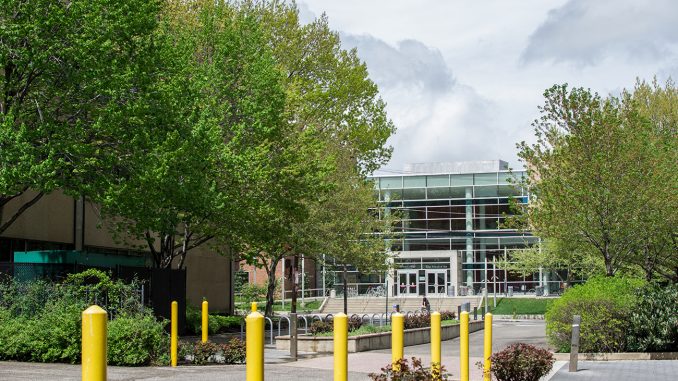
Temple University released a Climate Action Plan on Monday, Earth Day, that falls in line with Philadelphia’s goal to reduce carbon emissions 80 percent by 2050.
The university used the city’s climate plan as a reference for its own, said Kathleen Grady, the university’s director of sustainability and chair of the Climate Leadership Working Group. City Council approved a purchase agreement with a solar company in November to power city facilities, and the university is looking to mirror this strategy, Grady added.
“We wanted to look at the city’s documents because we recognize that we are a large institution and player in the city of Philadelphia,” she said. “…We need to be working in a coordinated way.”
The university will partner with an outside renewable energy provider, but has not yet decided what type of energy will be used and what company will source it. Using an off-site energy partner will be cheaper because it will have a larger and more efficient power facility than if it were built on-campus, Grady said.
“We’re expecting the plan to pay for itself,” she said. “Other portions of the plan that require funds will create finance through the savings from the energy efficiency projects.”
The Climate Action Plan includes ways to make facilities more energy efficient and adaptable to changing climate and educate the Temple community about sustainability goals.
The university also conducted a waste study as part of the plan, discovering that, too often, coffee cups were put into recycling containers. Those cups — for hot or iced coffee — aren’t recyclable, Grady said, and students and companies on campus need to rethink their packaging.
The Climate Leadership Working Group, a collection of students and university staff in operations and academics formed in 2016, coordinated with 300 people to create the new Climate Action Plan. That included Temple students, faculty and staff; city officials and climate change experts, Grady said.
Sarah Kuchan, the director of grounds and sustainability for Temple Student Government, sat in on a series of town halls during Fall 2017 to represent students in the Climate Action Plan. At the town halls, attendees offered feedback, critiques and suggestions to the Office of Sustainability about reducing Temple’s carbon footprint. Grady also went directly to classes, which ensured students who couldn’t make it to the town halls were heard, Kuchan said.
From 2006-18, the university reduced all its U.S. campuses’ net greenhouse gas emissions by 7 percent, even when it expanded by more than 2.2 million square feet and increased enrollment by more than 9,000 full-time students, according to the 2019 Climate Action Plan report.
In 2018, the university jumped from a bronze to silver rating in the Sustainability Tracking Assessment and Rating System, The Temple News reported in September. Every building on campus built after 2014 is certified by Leadership in Energy and Environmental Design, a green building rating system, and the university improved its stormwater drainage.
Compared to the university’s 2010 Climate Action Plan, the new plan redefines the best practices to reduce carbon emissions based on evolving research. It takes the United Nations’ Intergovernmental Panel on Climate Change into account, which announced in October that if current practices continue, the world would reach a 34.7 degrees Fahrenheit temperature increase between 2030 and 2052, meaning sea levels would rise and ecosystems would be lost more quickly.
As part of the 2019 plan, new student orientation will be more focused on sustainable living, and there will be a shift in the campus culture around protecting the environment, Kuchan said. Incoming freshmen will see institutional changes in terms of the university’s energy sources, and facilities that are more sustainable over their four years at Temple, she added.
Students can also expect to see changes in the university’s Dining Services, including switching to more eco-friendly food packaging, Kuchan said.
The university will incorporate sustainability into students’ academic curriculum, said Jacek Ghosh, the director of sustainability education. The university offers certificates in sustainability and is working to introduce interdisciplinary degrees between the Tyler School of Art’s Environmental Design program and the College of Public Health.
Students need to be involved for real change to occur, Ghosh said.
“If students aren’t here advocating, you can have a good plan, but things will just go back to the way they were,” Ghosh said.
“We need people to push,” he added.


Be the first to comment